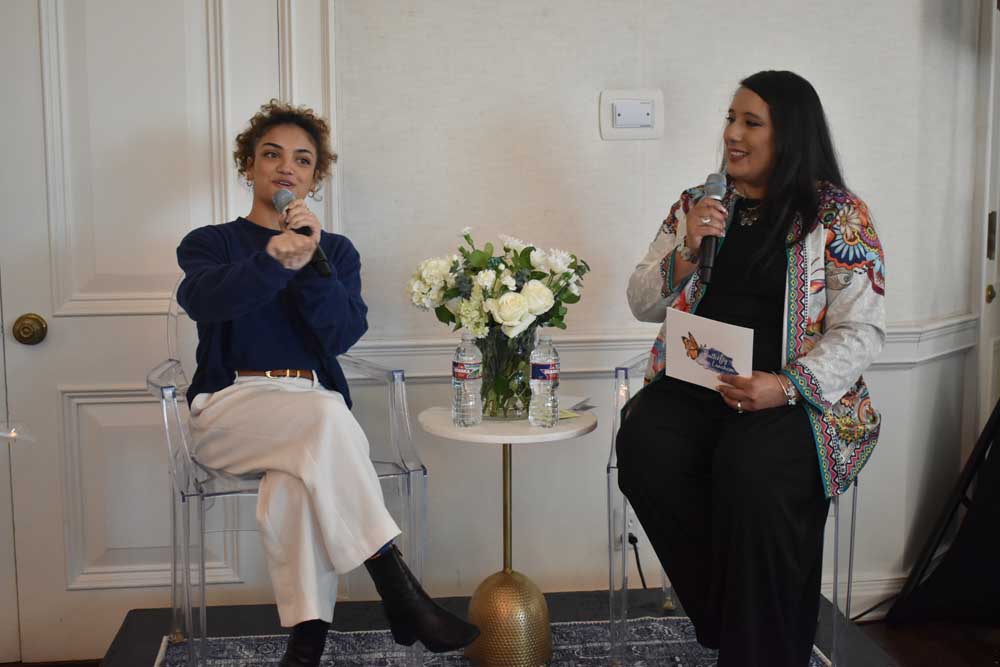Olympic medalist Laurie Hernandez’s grandmother had Alzheimer’s. At a Tyler luncheon, she shared her story.
Published 5:35 am Friday, September 27, 2024

- Olympic gymnast Laurie Hernandez and Hispanic Business Alliance president Nancy Rangel during the annual Butterfly Hope Luncheon at Willow Brook Country Club on Thursday. (Raquel Villatoro/Tyler Morning Telegraph)
When former Olympic gymnast Laurie Hernandez was 16 years old, she qualified for the 2016 Rio Olympics. After winning a gold team medal and an individual silver medal for beam at the Olympics, she went on to participate in “Dancing with the Stars” and won. Throughout this time, her grandmother, who Hernandez called “Yeya,” was experiencing health issues.
At the time she was selected for the Olympics, she did not know her grandmother had Alzheimer’s.
“It’s like grieving before the person passes,” Hernandez said. “It’s an odd experience with Alzheimer’s. I’m recognizing that this person is kind of shifting into a different person, but they’re still here.”
During the Alzheimer’s Alliance of Smith County annual Butterfly Hope Luncheon on Thursday, Hispanic Business Alliance President Nancy Rangel interviewed Hernandez in a fireside chat. Hernandez spoke about her grandmother’s journey with dementia, being an announcer for the Paris Olympics and her future goals.
Hernandez is currently a junior at New York University majoring in drama and minoring in creative writing. She is also a mental health advocate.
In 2024, Hernandez was an NBC sports analyst for the Paris Olympics. She was one of the youngest commentators.
“I am so grateful that NBC allowed me to go…” Hernandez said. “I just felt a lot of responsibility but … I think I was able to just relax and be myself. And people seem to receive that super well.”
For Hernandez, being behind the scenes was a positive experience. She did not have to deal with the stress that came with being on the world stage. However, there was one area she missed competing in: beams.
At the Paris Olympics, multiple gymnasts slipped on the beam.
“Someone put butter on the beam or something,” Hernandez said. “I’m not sure what happened there but there were a lot of mistakes.”
Hernandez learned from her grandmother to go for what she wants. She has published a memoir, a children’s book and now is pursuing acting. At NYU, she is looking forward to doing
Latinos are 1.5 times more likely to develop Alzheimer’s, Rangel said during the fireside chat.
It can be a difficult, traumatic experience, said Hernandez.
“It feels worse than anything else,” Hernandez said. “And the thing that I want to recognize is that, yes, it is a unique experience, but it is not an uncommon one.”
Hernandez was young when she learned her “Yeya” had Alzheimer’s. Her family waited to tell her. She believes kids are smart and will notice changes in family members; they should know what is happening.
“That’s a difficult conversation,” Hernandez said. “But it also allows for a child’s voice to expand a bit when someone might be repeating herself over and over again or asking the same question. … it’s worth it to have that conversation, and it also just teaches them a lot.”
The Alzheimer’s Alliance provides education and case management to help guide families. Having these efforts to connect families with resources is important, according to Alzheimer’s Alliance Executive Director Bonnie Varner.
“Because we’re all going to be there one day,” Varner said. “And it’s really important to me having a high quality of life and end of life dignity, and I’ve just seen that in this position, and become more and more grateful for the people who try to give their loved ones that.”
For more information on the Alzheimer’s Alliance visit, https://alzalliance.org/.


